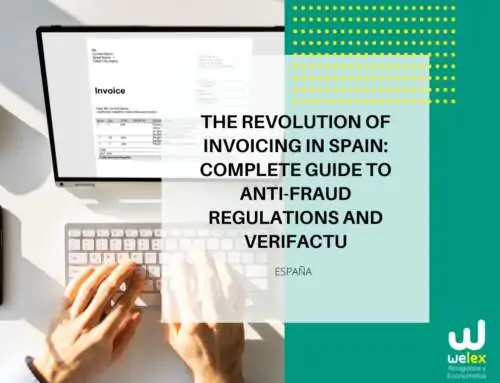As part of a real estate development in Spain, there are various legal obligations that must be carefully considered, especially when hiring third parties to carry out construction work. At Welex, a law and economics firm based in Marbella, we remind you that every developer must request a certificate from the contracted company proving that it is up to date with Social Security payments. Below, we explain what this obligation entails, who it affects, and its practical implications.
1. Why must a real estate developer request the Social Security certificate?
When a real estate development company in Spain, especially in places like Marbella, hires a company to carry out construction work, it is legally required to request a certificate proving compliance with Social Security. This is not merely a regulatory formality, but a legal and financial safeguard against potential non-payments.
2. Legal Basis: Article 42.1 of the Workers’ Statute
What exactly does this regulation establish?
The Royal Legislative Decree 2/2015, in its Article 42.1, establishes that any company subcontracting part of its activity must:
-
Verify that the contracted company is up to date with Social Security in Spain.
-
Request a negative debt certificate from the General Treasury of Social Security.
-
Ensure that the certificate is issued within a maximum period of 30 days, with no extensions allowed.
3. Who does this obligation apply to?
This requirement applies to both private and public entities. In the case of a real estate developer, construction is part of its regular activity, so it must always verify the status of the contracted company.
4. What is considered “own activity”?
The term refers to activities within the company’s regular production cycle. For developers, construction works are considered the core of their operations, and thus are directly subject to this legal obligation.
5. What risks exist if the certificate is not requested?
Failure to request this document may result in:
-
Unnecessary financial risks for the developer.
-
Possible sanctions for non-compliance with labor regulations.
Requesting the certificate is therefore a key preventive measure.
6. How often should the certificate be renewed?
Although the law does not establish an exact validity period, these certificates are generally valid for approximately 6 months. For long-term projects, it is advisable to:
-
Request periodic updates.
-
Constantly verify the status of the company.
7. Are there any exceptions to this obligation?
There are no specific exceptions. Only if the contract is not related to the main activity of the hiring company might it not apply. In the case of real estate developers, this exception does not apply since construction works are directly related to their business.
Conclusion
Real estate development companies in Marbella or anywhere in Spain must, as a rule, request the Social Security compliance certificate from any company they hire to carry out construction work. This not only complies with the law but also provides legal and financial protection in case of breaches by the contractor. Ultimately, if you represent a development company in Spain, you must be fully aware of the importance of requesting this certificate from any company you contract for construction work.
At Welex, your law and tax advisory firm in Marbella, we offer comprehensive advice to ensure every step of your real estate project complies with current regulations and is carried out with full legal security. Do not hesitate to contact us for personalized assistance in managing your contracts and obligations with Social Security in Spain.
Administrative Decisions in Spain
Regarding administrative decisions, there is Resolution No. 1126/2018 from the Central Administrative Court of Contractual Appeals, dated 07/12/2018, which, although referring to a public procurement context, mentions a “Certificate of compliance with Social Security obligations dated 11/09/2018, certifying that there are no ‘outstanding claims for overdue Social Security debts pending collection’.” This resolution highlights the practice of requesting certificates proving compliance with Social Security payments within the scope of contracting.
Consequences of Not Requesting the Certificate
Although the materials provided do not explicitly detail the consequences of failing to request the certificate, it is important to note that Article 42 of the Statute of Workers establishes a liability regime for main companies concerning salary and Social Security obligations incurred by contractors and subcontractors.
Lack of due diligence in verifying Social Security compliance by contractors could result in subsidiary liabilities for the hiring company in case of non-payment by the contractor.
Statute of Workers Law (Royal Legislative Decree 2/2015, of October 23)
Excerpt
ARTICLE 42. Subcontracting of works and services. 1. Companies that contract or subcontract with others for the execution of works or services corresponding to their core activity must verify that such contractors are up to date with their Social Security contributions. To this end, they shall request in writing, identifying the affected company, a negative certificate for debts from the General Treasury of the Social Security, which must issue such certificate without fail within a non-extendable period of thirty days and under the conditions established by regulation.
Summary
Article 42 clearly states that companies contracting or subcontracting works or services must verify that contractors are up to date with their Social Security contributions. This is done through obtaining a negative certificate for debts from the General Treasury of the Social Security.
Excerpt
Entrepreneurs who contract or subcontract with others for the execution of works or services corresponding to their core activity must verify that such contractors are up to date with their Social Security contributions. To this end, they shall request in writing, identifying the affected company, a negative certificate for debts from the General Treasury of the Social Security, which must issue such certificate without fail within a non-extendable period of thirty days and under the conditions established by regulation.
Summary
This excerpt clearly states that entrepreneurs contracting or subcontracting works or services must verify that contractors are up to date with their Social Security contributions. This is done by obtaining a negative certificate for debts from the General Treasury of the Social Security. Therefore, a real estate development company in Spain must request such a certificate from the company it hires to carry out a construction project.
Resolution No. 1126/2018 from the Central Administrative Court of Contractual Appeals, 07/12/2018
Excerpt
Certificate of compliance with Social Security Obligations dated 11/09/2018, certifying that there are no ‘outstanding claims for overdue Social Security debts pending collection’
Summary
This excerpt mentions the requirement for a certificate of compliance with Social Security obligations as part of the documentation required in a public procurement process. Although the context is public contracting, it suggests that proving compliance with Social Security obligations is a relevant requirement in contractual processes, which could be extrapolated to the private sector as a good practice to ensure legal compliance by contracted companies.






Social Media